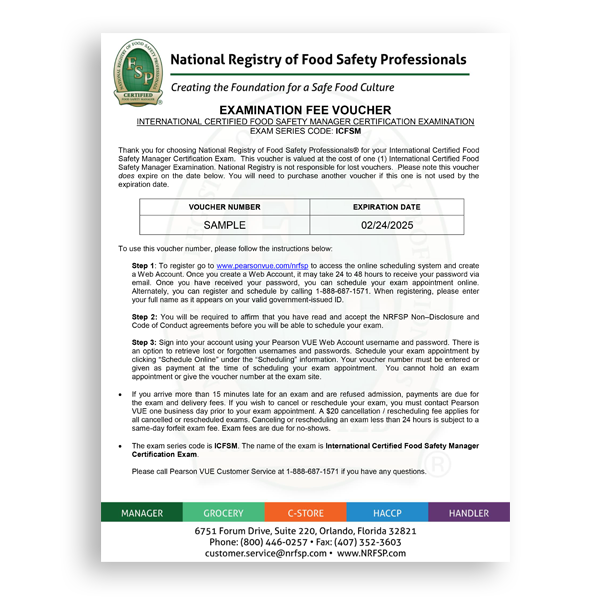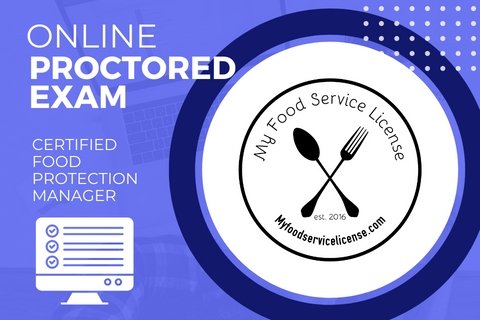Professional Training for Food Manager Qualification Made Simple
The relevance of food supervisor accreditation can not be understated, specifically in an age where food safety and security is critical. Expert training programs have actually evolved to simplify the certification procedure, offering essential understanding and practical skills essential for effective food monitoring. These programs cover crucial subjects, from foodborne ailment prevention to compliance with health guidelines. Nonetheless, real worth of this training expands beyond simple qualification; it has profound ramifications for profession advancement and public health and wellness. Comprehending just how these components interconnect may reveal chances that are commonly overlooked.
Relevance of Food Manager Certification
The significance of Food Manager Certification can not be overemphasized in today's food service industry. This certification signifies that food supervisors have the crucial knowledge and abilities to make sure food security, maintain wellness criteria, and promote regulative compliance. In an era where foodborne ailments can have extreme repercussions, the role of a certified food supervisor becomes essential in protecting public wellness.
Food Supervisor Certification not just furnishes individuals with the competence to alleviate and recognize food safety risks yet likewise boosts the trustworthiness of the establishment. Consumers are increasingly critical; they seek assurance that their eating experience is safe and sanitary. Certification functions as a mark of professionalism that can bring in and maintain customers.
In addition, regional territories and many states mandate that facilities use certified food managers to abide by wellness policies. This need underscores the accreditation's value in preventing possible lawful ramifications and fines. In addition, a certified food supervisor can lead team training, fostering a culture of safety and accountability within the work environment. Buying Food Manager Accreditation is a financial investment in quality, safety and security, and the general success of food solution procedures.
Review of Expert Training Programs
Specialist training programs for food supervisor certification are designed to provide extensive education on food security methods, regulative conformity, and danger administration. These programs intend to gear up food service professionals with the knowledge and skills needed to guarantee secure food handling and preparation in various setups, consisting of dining establishments, providing solutions, and institutional food procedures.
Normally, professional training programs include both academic and functional components, permitting participants to involve with real-world circumstances. The educational program frequently consists of necessary topics such as foodborne diseases, proper food storage methods, hygiene procedures, and employee training approaches. Moreover, these programs are often updated to straighten with the current market standards and policies, making sure that participants get existing and relevant information.
Numerous programs use flexible delivery methods, including in-person courses, on-line programs, or a hybrid strategy, accommodating different learning choices and schedules. Upon successful completion, individuals generally get certification, which is usually recognized by neighborhood health and wellness divisions and governing firms, improving their occupation leads within the food solution market. On the whole, professional training programs play a crucial duty in fostering a culture of food safety and security and compliance among food managers and team.
Key Topics Covered in Training
Food security is an essential emphasis in food manager accreditation training, including a selection of essential topics that guarantee individuals are well-appointed to take care of food safely. One of the primary subjects covered is the relevance of individual health, which includes proper handwashing strategies and the significance of preserving tidiness in food preparation locations.
Furthermore, the training addresses foodborne illnesses, detailing the various pathogens that can pollute food and the signs linked with these ailments. Individuals discover regarding the conditions that promote bacterial growth, which is vital for avoiding break outs.
Temperature control is another vital subject, stressing the risk-free food preparation, cooling, and storage temperatures necessary to lessen threats. The training likewise covers cross-contamination prevention strategies, ensuring that raw and prepared foods are managed appropriately to stay clear of unsafe communications.
Furthermore, food safety laws and guidelines, such as those stated by the FDA and regional health divisions, are discussed to give an extensive understanding of conformity demands. Effective bug control measures are taken a look at to protect food facilities from problems that can endanger security. Collectively, these topics lay a strong structure for secure food administration practices.
Benefits of Specialist Training
How can professional training improve food safety practices within an establishment? Specialist training equips food managers with extensive expertise of food safety and security policies, market requirements, and finest practices. This foundational understanding is important for keeping a tidy and safe cooking atmosphere, eventually minimizing the threat of foodborne diseases.
Moreover, expert training fosters a proactive method to food security by highlighting safety nets and danger evaluation. Managers educated by sector specialists can effectively recognize possible threats and apply strategies to alleviate them. This not only secures clients however likewise enhances the facility's reputation and dependability.
Additionally, professional training urges a society of constant enhancement. Food managers who take part in ongoing education and learning are much better prepared to adapt to new regulations and fads in the food solution market. This adaptability can bring about boosted operational effectiveness and cost financial savings.


Steps to Accomplish Qualification
Attaining qualification in food monitoring calls for a methodical strategy that encompasses several vital actions. Individuals need to choose an her comment is here approved training program that supplies detailed coursework in food safety and security, hygiene, and monitoring principles - Manager Certification Training. These programs often give useful resources, including research materials and method exams
Following, candidates ought to proactively take part in the training sessions, whether in-person or on the internet, to boost their understanding of necessary topics such as foodborne illnesses, individual health, and correct food storage techniques. Engagement in discussions and sensible exercises can further reinforce discovering.

As soon as properly prepared, prospects can take the examination and set up. Effective conclusion usually needs accomplishing a certain passing rating, which shows a thorough grasp of food safety standards.
Conclusion
In recap, specialist training for food supervisor accreditation plays an essential duty in making certain food safety and security and compliance with regulatory requirements. Ultimately, attaining food manager qualification with expert training not just elevates private competencies however additionally promotes a more secure food atmosphere for all.

Specialist training furnishes food managers with detailed understanding of food security policies, sector standards, and ideal techniques.In recap, professional training for food manager certification plays a critical duty in making certain food safety and security and conformity with regulative requirements (ServSafe Food Manager Certification). Eventually, attaining food supervisor accreditation through specialist training not just boosts specific expertises however also fosters a more secure food atmosphere for all